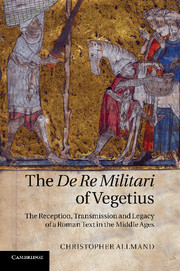 The De Re Militari of Vegetius
The De Re Militari of Vegetius Book contents
- Frontmatter
- Contents
- Figures
- Preface
- Abbreviations
- Introduction
- Part I The medieval reception
- 1 General remarks on the manuscripts
- 2 Analysis of the manuscripts
- 3 A particular response to the De re militari…and its influence
- 4 Bedfellows
- 5 Owners and their texts
- Part II The transmission
- Part III The legacy: the De re militari in medieval military thought and practice
- Appendix I Table of select terms used in translations of the De re militari
- Appendix II List of manuscripts of the De re militari
- Bibliography
- Index
- References
2 - Analysis of the manuscripts
from Part I - The medieval reception
Published online by Cambridge University Press: 07 October 2011
- Frontmatter
- Contents
- Figures
- Preface
- Abbreviations
- Introduction
- Part I The medieval reception
- 1 General remarks on the manuscripts
- 2 Analysis of the manuscripts
- 3 A particular response to the De re militari…and its influence
- 4 Bedfellows
- 5 Owners and their texts
- Part II The transmission
- Part III The legacy: the De re militari in medieval military thought and practice
- Appendix I Table of select terms used in translations of the De re militari
- Appendix II List of manuscripts of the De re militari
- Bibliography
- Index
- References
Summary
This chapter is intended to introduce the reader to, and concentrate his attention upon, a particular view of Vegetius’ work, that taken by those largely unknown persons who read his text in the period between the ninth and the fifteenth centuries. Today, writing in the margins of books not owned by the reader is normally frowned upon. In earlier times, readers were less afraid to express themselves, whether it was to record, with an excitement or pleasure which can sometimes still be felt, a discovery just made, to correct or question a text, or to draw attention to an important idea well expressed. To the historian, such comments, some conveyed as small drawings, are a godsend, since they often represent the spontaneous reaction of readers to the text before them.
In this chapter, an attempt will be made to utilise the examination of some 200 or more Latin manuscripts of the De re militari to see, among other things, what parts of the text interested readers, and whether they thought Vegetius’ ideas were applicable to their own day, and (although this has proved difficult) to judge whether conditions and circumstances in the readers’ own times made some passages or sections of the work more interesting or relevant to them than others. It is clear that interest in different parts of the text varied with the times at which they were read. This we learn from focusing on the marginalia found in the surviving manuscripts, marginalia which are key witnesses with valuable things to reveal as we try to understand how the text of the De re militari may have been understood and appreciated by its medieval readers.
- Type
- Chapter
- Information
- The De Re Militari of VegetiusThe Reception, Transmission and Legacy of a Roman Text in the Middle Ages, pp. 17 - 46Publisher: Cambridge University PressPrint publication year: 2011


